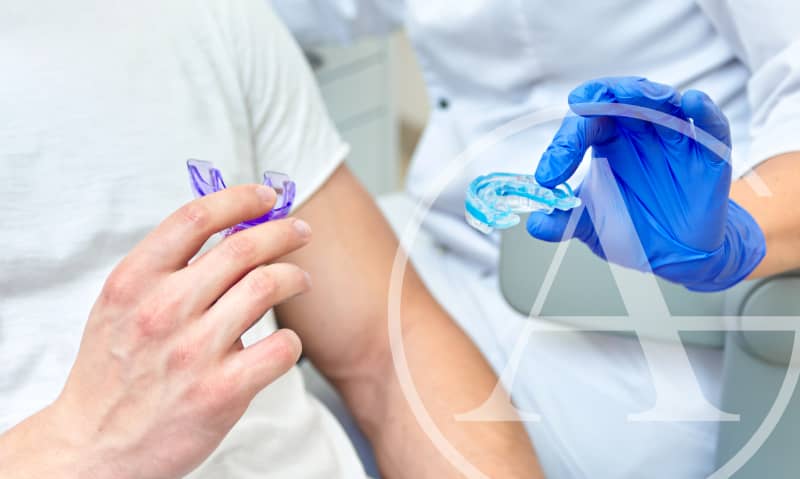Who Needs a Custom Mouth Guard and How Is it Made?

Protect your oral health with a custom-made mouth guard.
Mouth guards provide a straightforward and effective solution for a variety of problems. They protect your teeth in certain situations and against specific conditions, ensuring continued oral health for years to come. However, not all mouth guards are made equal.
A custom mouth guard will deliver better performance in any of the following situations.
4 Reasons You May Need a Custom Mouthguard
1. Grinding or Clenching Your Teeth
Grinding or clenching your teeth in your sleep can cause serious damage, wearing down your enamel and increasing your risk of tooth decay. Grinding can also cause headaches and jaw pain.
However, it’s not always easy to know if you’re grinding your teeth at night—you might not notice until your teeth already show signs of damage, such as chips or cracks.
Your dentist will be able to spot signs of grinding and provide you with a nightguard. A nightguard provides protection from grinding. This type of mouth guard is worn while you sleep and prevents your upper and lower rows of teeth from grinding against each other.
2. TMJ Disorders
A temporomandibular joint (TMJ) disorder can lead to jaw pain and difficulty chewing and biting. If you grind your teeth while you sleep or your jaw sits in an irregular position, you can experience stress on the joint, which leads to pain.
A nightguard can also be an effective option to relieve TMJ disorders. The nightguard can hold your jaw in the proper position, preventing the soreness and pain that often come with TMJ disorders.
3. Sleep Apnea and Snoring
Sleep apnea is a condition where you jolt awake suddenly throughout the night as your throat muscles relax and block your airway. It can lead to you feeling tired throughout the day and eventually experiencing serious health conditions, such as high blood pressure.
Sleep apnea is often associated with sleeping with your mouth open and usually causes snoring as well. You can try remedies such as sleeping on your side or treating nasal congestion, but these remedies may not treat the underlying issues. In more advanced cases of sleep apnea, you could need a CPAP mask that provides pressurized air during sleep.
However, the right mouth guard can often help alleviate sleep apnea. Positioning the jaw in the proper way helps prevent your throat muscles from relaxing and blocking the airway. You can enjoy better sleep and deal with snoring as well.
4. Protection During Sports
Sports and other physical activities can put your teeth at risk, especially where contact or falling down are expected. A sports mouth guard protects your teeth against chips and cracks during sports activity.
One of the biggest risks during physical activity is contact forcing your jaw to close at high speed and with force. When your upper and lower rows of teeth make contact, teeth on either side can damage each other. A sports mouth guard provides a protective layer that cushions the blow to protect your teeth.
Custom-Made vs. OTC Mouth Guard
One of the biggest distinctions when it comes to mouth guards is choosing between custom-made and over the counter (OTC). There are many OTC mouth guards available, but they aren’t as effective as custom-made ones.
No matter what type of mouth guard you need, custom-made is the way to go. When comparing a custom-made vs. OTC mouth guard, you achieve greater protection and comfort with a better fit.
If you’re considering custom-made vs. OTC mouth guards for your needs, keep in mind that the way they’re made is completely different. Your custom mouth guard is made by your dentist to perfectly match your teeth, providing the best possible fit.
An OTC mouth guard will either have no special fit at all, or rely on heating and then biting the mouth guard. This process still doesn’t provide a very good fit.
How Your Custom Mouth Guard Is Made
Each of these situations requires a different type of mouth guard tailored to that use. The type of protection you need from a sports mouth guard is different from the protection of a nightguard.
Your dentist will take an impression of your teeth to create your custom mouth guard. The mouth guard itself can be made of different materials and in different configurations to fit the specific use you need it for.
When to Wear Your Custom-Made Mouth Guard
Sports guards are worn during physical activity and then removed afterward. For grinding, clenching, sleep apnea, and snoring, you’ll wear your nightguard overnight. Mouth guards for TMJ disorder also often need to be worn at night.
Caring for Your Mouth Guard
Make sure to rinse your mouth guard immediately after wearing it. You can use a standard toothbrush and mild soap to clean the mouth guard, but don’t use toothpaste, as it can wear away at the soft material. You will also want to let your mouth guard dry completely after cleaning before putting it in its case to prevent any bacterial growth.
Find the Protection You Need with Exceptional Dentistry
No matter the reason you need a mouth guard, you can achieve better results and stay more comfortable with a custom mouth guard. The compassionate team at Dallas Cosmetic Dental uses the latest technology to provide a variety of mouth guards suited for your specific needs. Book an appointment to get your custom mouth guard today.